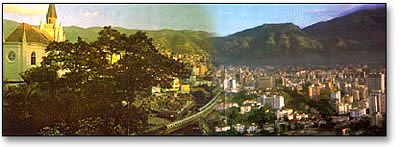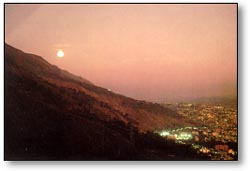
Caracas
An Introduction
Venezuela's capital, founded in 1567 by Diego de
Losada, has one of most dramatic settings among South American cities. It sits about 3000
feet above sea level in a long valley that stretches from east to west. On one side of the
valley are the uninhabited emerald slopes of Avila National Park; on the other, the rugged
and heavily settled hills of the southern suburbs. The slopes of the Park rise above the
city like immense green wave, forever on
the verge of breaking. The elevation and proximity the ocean (about 15km to the north)
combine to give Caracas almost unbeatable weather.
immense green wave, forever on
the verge of breaking. The elevation and proximity the ocean (about 15km to the north)
combine to give Caracas almost unbeatable weather.
In recent decades, especially during oil booms of the 1970s and 80s, Caracas has seen
unprecedented growth. Many of the original colonial buildings were replaced by gleaming
modern skyscrapers, although there are still historic jewels to be found within the modern
shadows. A majority of the cultural and architectural attractions can be found in the area
immediately surrounding Plaza Bolivar, the city center.
Those wishing to explore the areas immediately around the city will be well-rewarded. The
omnipresent Avila National Park offers incredible views of both Caracas and the nearby
coast, which is also worth an excursion.
Copyright (c) 1998-2010 interKnowledge Corp. All rights reserved.
